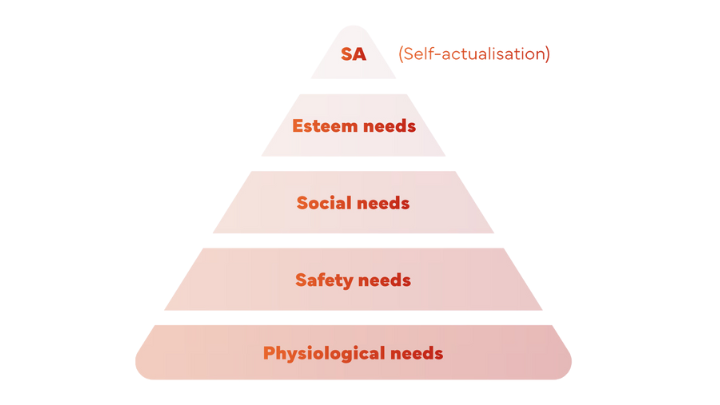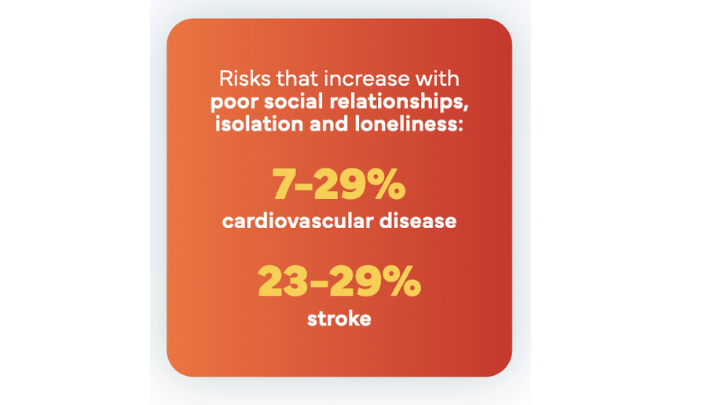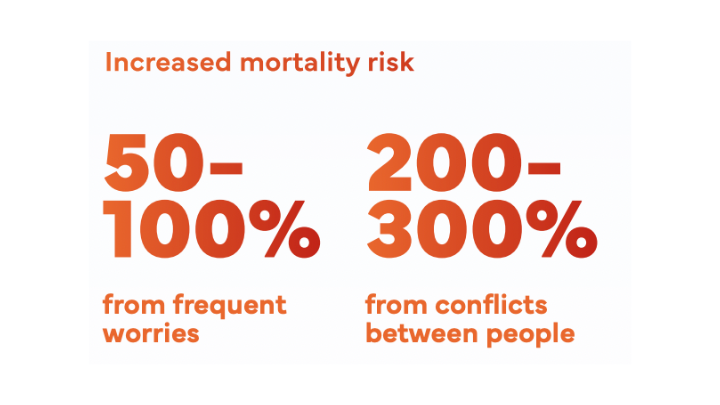Don't forget to share the love! Why social health matters.

Everyone loves spending time with their friends, family, or work colleagues but this social interaction also acts like a superpower, giving us a wide range of health benefits.
Positive social relationships give us protective health effects by providing healthy role models and encouraging healthy behaviours.[47] It may be that your friend joins a gym or signs up for a 5k race and you go along to keep them company.
Being part of a group, whether that’s a loving family or the team you spend time with at work, is good for your mental health too. As well as making you feel connected to others, it promotes self-esteem and gives you a sense of purpose in life.
Having this support squad can also protect you from the stresses that life throws our way. Whether it’s money worries, family health issues, or a bad day at the office, being able to share your concerns with someone else can make a huge difference. As the saying goes, a problem shared is a problem halved.
The value of social interaction came under the spotlight during the Covid-19 pandemic. Measures such as lockdowns and social distancing meant we were forced to spend more time apart and, in many cases, alone. A review of studies conducted around the world found that being forced to drop the social part of life had an impact on the mental health and well-being of the adult population.[48] And while you might not need an excuse, spending more time together now could help to undo some of that damage.

Social belonging takes up level three of Maslow’s hierarchy of needs. After fulfilling the more basic physiological needs (food, water, clothing etc) and safety needs (housing, employment), humans turn to their social needs, which include building relationships, starting families, and gaining a sense of belonging. This shows the value placed on social bonds as Maslow argued that this need had to be satisfied before individuals could progress to higher levels of esteem and self-actualisation.
Risks of poor social interaction
Humans are social beings, constantly looking to build relationships and communities to thrive. Take away that social element, or have stressful social relationships with others, and there are some significant implications for many areas of our health and well-being.
Since it started back in 1938, the Harvard Study of Adult Development has consistently shown that good relationships are a crucial factor for physical and mental health, happiness, and longevity.[49] Social ties and networks stood out consistently as powerful predictors, trumping other factors such as genes and socio-economic status.
As well as the positives of an active social life, numerous studies have found that, as social interaction decreases, physical health risks increase.

The risk of other chronic conditions including cancer, diabetes, Alzheimer’s disease, and chronic respiratory disease is also higher for individuals without friends and family to support them. Researchers across several studies found that strong relationships lowered the risk of all these conditions.[50-52]
Given its influence on other areas of our health, having less social interaction can also increase mortality risk. A study of nearly 7,000 adults in California over a nine-year period found that those who lacked social and community ties were more likely to die over the course of the study.[53]
-
2.3 for men and 2.8 for women The age-adjusted relative risks for those most isolated compared to the most social.
It’s not just a lack of social interaction that is harmful to our health. Stressful social relations are also associated with increased mortality, as discovered in one Danish study.[54]

Action points
These are some key action points to help make social interaction a healthy and rewarding part of life.
- Make time for friends and family: Everyone has busy lives but taking time out to spend with loved ones has so many health benefits, it should be a priority. The positive energy and mental health benefits will feed through into everything you do.
- Work together: Whether it’s a work project, a fitness challenge, or fundraising for a charity, working as a team can make it much more fun and creative. Being around other people can spark ideas and new ways of thinking.
- Log in to social media: Sharing the good stuff with your friends can be a great way to connect. Using social media to ask for tips, recommendations or simply to share what you’re up to can kick off meaningful interactions with others.
- Check-in on home workers: Home and remote workers usually don’t have the social network of someone working in a busy office. Taking a few minutes to catch up with them will give them – and you – valuable social interaction and show you care.
- Go digital: As well as letting you track metrics such as your steps, sleep or workouts, many health apps have social features. Getting kudos from a friend or setting up a step challenge with your colleagues can feed your social needs.
References
- [47] Vila, J., 2021, Social Support and Longevity: Meta-Analysis Based Evidence and Psychobiological Mechanisms
- [48] Pai N. et al, 2021, COVID-19 and loneliness: A rapid systematic review
- [49] Mineo L, 2017, Good genes are nice, but joy is better (in The Harvard Gazette)
- [50] Naito, R. et al, 2021, Impact of social isolation on mortality and morbidity in 20 high-income, middle-income and low-income countries in five continents
- [51] Tan, J. et al, 2019, Social Integration, Social Support, and All-Cause, Cardiovascular Disease and Cause-Specific Mortality: A Prospective Cohort Study
- [52] Løkken, B. I. et al, 2021, Association of engagement in cultural activities with cause-specific mortality determined through an eight-year follow-up: The HUNT Study, Norway
- [53] Berkman, L. F. et al, 1979, Social networks, host resistance, and mortality: a nine-year follow-up study of Alameda County residents
- [54] Lund, R. et al, 2014, Stressful social relations and mortality: a prospective cohort study
